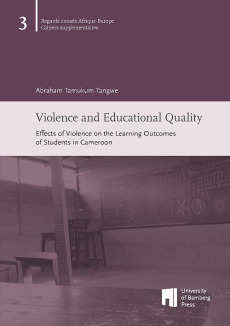Abraham Tamukum Tangwe
Violence and educational quality
effects of violence on the learning outcomes of students in Cameroon
Reihe: Regards croisés Afrique-Europe. Cahiers supplementairesThis study was initiated to examine violence and its relation to learning outcomes of secondary school students in Cameroon. The study interconnected with educational quality values, and responsible behavior. Violence at school is still observable on a daily basis, not respecting the human rights of children and young learners and hindering them from learning despite the attempts of the government in Cameroon to institute quality service delivery policies, more equitable distribution of learning opportunities, and a strong incentive for greater efficiency in school through legislations. The study was guided by the social interaction theory and the research question focused on the extent of violence in education. The specific objective of this study was to understand the effects of violence on motivation and self-esteem, and its influence on learning outcomes. A model was operationalized measuring the different forms of violence, mediated by self-esteem, motivation and health to the learning outcome, quantified by class repetition, grades and reading enjoyment. The socio-economic context was statistically controlled. The study was designed using a quantitative approach with cross-sectional survey for students. Data had been collected from a sample population of 924 students in grades four to seven in Cameroon. The collected information was analyzed using descriptive statistics, and inferential statistics. The results indicate an acute prevalence of school the various forms violence, and the huge ratio of violence in the life of students in Cameroon becomes visible. The study shows that these experiences of violence affect the self-esteem and the motivation to learn. In addition, the poor school quality and a very discouraging socioeconomic background of students can be shown. Schools are neither an environment of the protection of students nor open spaces for real-world transmission of values. Violence remains a challenge.

